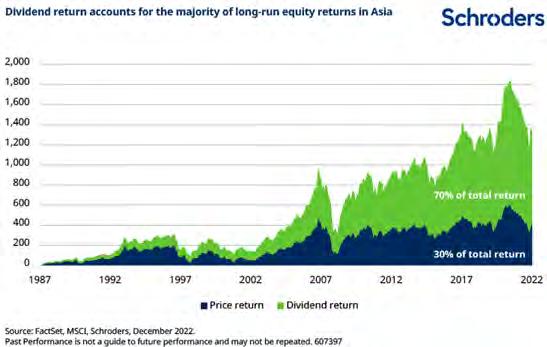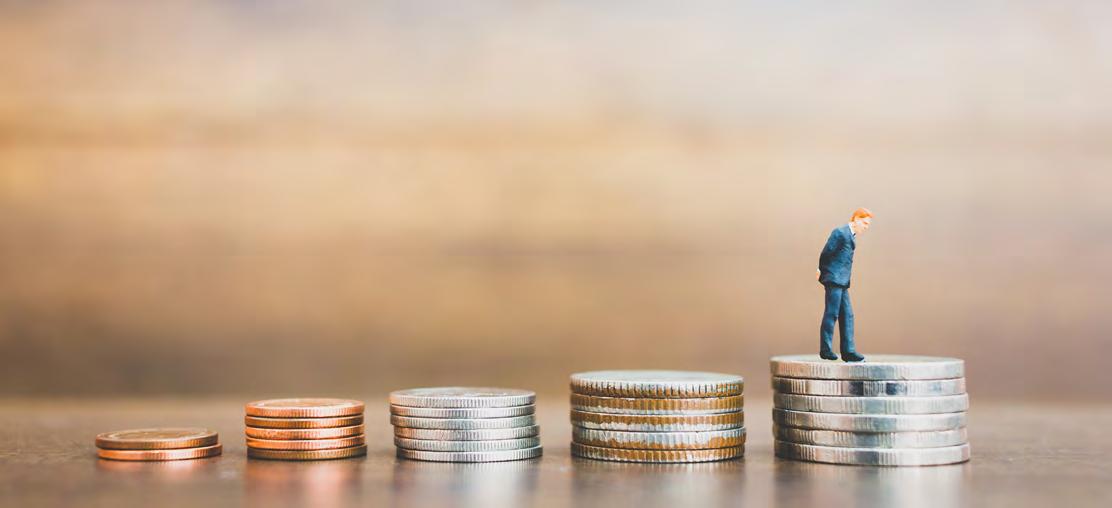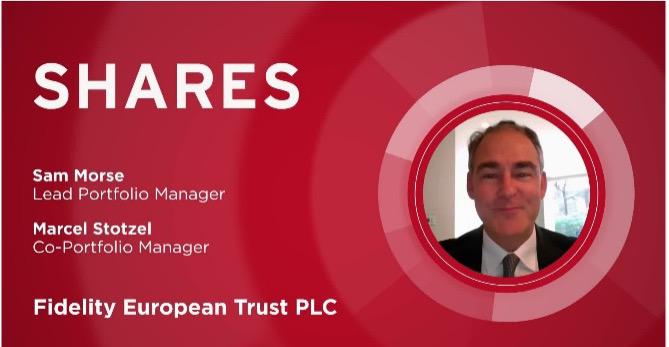3 minute read
The compelling case for dividend investing in Asia

It is no secret that stock markets are generally obsessed with share price appreciation. As tales of “multi-baggers” abound in Asia, many an investor has been seen chasing pipe dreams. Yet when one takes a step back and decomposes the region’s equity performances, in reality almost threequarters of Asia’s long-run equity returns have historically come from dividends.
this is where the similarities end.
Abhorring the notion of paying dividends, Korean corporates have largely kept their payout ratios unchanged over the last two decades even as their Singaporean counterparts consistently raised theirs. This has seen companies from the Lion City deliver a whopping 690% dividend return to their investors over 1988-2022, a figure that easily dwarfs the 345% from the Land of the Morning Calm.
For investors hoping to take a leaf out of the history books, focusing on dividends is clearly key.
Consider the experiences of Singapore and Korea. Both countries were known for their rapid economic growth rates in the 1990s which propelled their economies from agrarian societies in the 1960s into the industrialised nations that they are today. Both their stock markets have also delivered almost identical price returns over the last 35 years. And yet
HIGHER DIVIDENDS = HIGHER EARNINGS GROWTH
Doubters, however, balk at this notion. Why bother with boring dividends in a vibrant place like Asia, signalling effect”. As such, for investors seeking to benefit from the Asian economic growth story, focusing on high payout companies is definitely key.
HIGHER DIVIDENDS = BETTER CORPORATE GOVERNANCE
In a region riddled with corporate governance pitfalls, focusing on dividends has the added benefit of keeping investors away from potential disasters. This is because companies reduce the temptation to waste money on value-destroying investments when they return excess cash to shareholders. They also subject themselves to more stringent levels of stakeholder scrutiny when they next tap the markets for funds.
Dividends can only be paid out of real earnings and real cash flows. As a result, Asian companies that pay high dividends are frequently also those with high corporate governance standards.
Dividend Stocks Appeal To Older Investors
What is of note is that older clients are also increasingly demanding more dividends from their investments. This is perhaps not surprising.
Behavioural economists Hersh Shefrin and Richard Thaler have long theorised that individuals do not see all money equally. Instead they mentally break down their wealth into three separate, nonfungible baskets, namely current income, current assets and future income. For them, the propensity to spend out of current income is always the greatest while the temptation to do the same out of future income is the least. And because dividends are viewed as current income, people are happy to spend them. Capital gains, on the other hand, are largely viewed as future income and “jam tomorrow”. The tendency to spend out of them is therefore much lower.
For older customers facing retirement, this distinction is important because they will increasingly prefer to receive dividends from their stocks in order to fund their consumption. This should also see them rotating more into stocks paying high dividends. In a world that is rapidly ageing, the demand for dividends from the growing cohorts of retirees and soon-to-retire will underpin demand for dividend payers, making these stocks attractive investments on a longer-term basis.
Given how big a component of long-term equity returns dividends have historically been, and knowing how strong their demand from the ageing population will be, any investor who is looking for fast-growing companies with strong corporate governance in Asia will do well to pay heed to them.
Explore a range of investment solutions through our Asian investment trust range at Schroders.
Schroder Oriental Income Fund Limited
Schroder Japan Growth Fund plc
Schroder AsiaPacific Fund plc
Schroder Asian Total Return Investment Company
This is a marketing communication.
Past performance is not a guide to future performance and may not be repeated.
The value of investments and the income from them may go down as well as up and investors may not get back the amounts originally invested.
The material is not intended to provide, and should not be relied on for, accounting, legal or tax advice, or investment recommendations. Reliance should not be placed on any views or information in the material when taking individual investment and/or strategic decisions.
Any reference to sectors/countries/stocks/ securities are for illustrative purposes only and not a recommendation to buy or sell any financial instrument/securities or adopt any investment strategy.
Information herein is believed to be reliable but Schroders does not warrant its completeness or accuracy.
For help in understanding any terms used, please visit address www.schroders.com/en/insights/ invest-iq/investiq/education-hub/glossary/
We recommend you seek financial advice from an Independent Adviser before making an investment decision. If you don’t already have an Adviser, you can find one at www.unbiased.co.uk or www.vouchedfor.co.uk
Before investing in an Investment Trust, refer to the prospectus, the latest Key Information Document (KID) and Key Features Document (KFD) at www.schroders.co.uk/investor or on request.
Issued in February 2023 by Schroder Unit Trusts Limited, 1 London Wall Place, London EC2Y 5AU. Registration No 4191730 England.
Authorised and regulated by the Financial Conduct Authority










